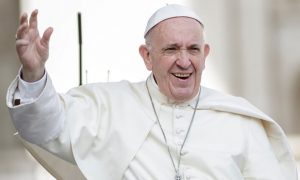Francis says he visited psychoanalyst for six months ‘to clarify a few things’ and that now nothing frightens him
Pope Francis has revealed that he sought the help of a psychoanalyst for six months when he was 42 and the leader of the Jesuit order in Argentina during the country’s military dictatorship.
The pope’s disclosure was made in a book based on 12 in-depth interviews with the French sociologist Dominique Wolton, to be published next week.
Francis said the weekly sessions with the psychoanalyst helped him a lot. “For six months, I went to her home once a week to clarify a few things. She was a doctor and psychoanalyst. She was always there,” he told Wolton for the 432-page book Pope Francis: Politics and Society.
“Then one day, before she died, she called me. Not to receive the sacraments – because she was Jewish – but for a spiritual dialogue. She was a good person.”
Francis told Wolton he now felt free. “Of course, I’m in a cage at the Vatican, but not spiritually. Nothing frightens me,” he said.
The pope also took aim at priests who were “rigid and afraid to communicate”.
The disclosure came when Francis was discussing the role and influence of the “courageous” women in his life, including his mother, his two grandmothers and Esther Ballestrino de Careaga, the communist founder of the Mothers of the Plaza de Mayo movement in Buenos Aires, who was killed during the dictatorship.
He also spoke of childhood sweethearts and adolescent girlfriends, saying his relationships with women had enriched his life. “I thank God for having known these true women in my life,” the pope told Wolton. “[Women see things differently from men] and it is important to listen to both.”
The Jesuit tradition is known to value psychoanalysis, with many regarding self-awareness and introspection as being complementary to spirituality.
Robert Mickens, the Rome-based editor of the English-language edition of Catholic daily newspaper La Croix, said Francis had previously acknowledged that social sciences could benefit human development.
“There has been a gradual shift in attitudes within the Catholic church towards psychotherapy since the 1970s,” Mickens said. “It’s very common in priest formation programmes, especially in the western world, for them to undergo a psychological evaluation before admission to a seminary or diocese. There’s a recognition that social sciences can help unearth issues that need to be dealt with.”
The pope’s “eye-popping” disclosures could challenge the perception among some people that those who sought treatment were weak, he said.
In 2008, the Vatican issued guidelines on the use of psychology in the training of priests. “In some cases, recourse to experts in the psychological sciences can be useful,” the paper said.
Among candidates for the priesthood “can be found some who come from particular experiences – human, family, professional, intellectual or affective – which, in various ways, have left psychological wounds that are not yet healed and that cause disturbances,” the guidelines said.
“These wounds, unknown to the candidate in their real effects, are often erroneously attributed by him to causes outside himself, thus depriving him of the possibility of facing them adequately.”
At the time of his sessions in 1978 or 1979, tensions over the leadership of Jorge Bergoglio, as Pope Francis was then known, were high among Argentina’s Jesuits.
He had earlier been accused of effectively delivering two fellow priests to the military authorities in 1976, when he refused to publicly endorse their controversial social work in the slums of Buenos Aires.
Argentina’s “dirty war” was over by the time of Bergoglio’s psychotherapy, but the military dictatorship was still in place.
However, there was continuing controversy over his divisive leadership. During his six years as provincial superior from 1973 to 1979, he upset some people with his determination to impose a fresh direction and purpose.
“It’s hard to know exactly what took him to seek psychotherapy – perhaps issues which had come to the fore as leader of the Jesuits,” said Austen Ivereigh, the author of The Great Reformer: Francis and the Making of a Radical Pope.
“It was certainly a tense time both nationally and internationally [for Jesuits], adding to what had been a difficult, although very successful, period for Bergoglio. He had gallstones soon after, which suggests a level of stress.
“But maybe he just wanted to take the time to take stock. Jesuits are not afraid of seeking professional help when they need it and see psychotherapy as complementary to spirituality. I think this revelation only adds to our already very human picture of a remarkable man.”
There are more psychologists per capita in Argentina than any other country in the world, according to researcher Modesto Alonso. In 2011, there were 196 psychologists for every 100,000 people compared with about 27 per 100,000 in the US.
In his conversations with Wolton, Francis said European countries exploited Africa in the colonial era, and although Europe had “important Christian roots … they are not the only ones. There are others that cannot be denied.”
Abortion, he said, was a “grave sin, it’s the murder of an innocent”. And while he insisted marriage was between a man and a woman, saying “we cannot change it, this is the nature of things,” the pope acknowledged the existence of same-sex civil unions.
Wolton’s book is published next Wednesday as Francis begins a six-day visit to Colombia, the first visit by a pope in more than 30 years. The South American country is bitterly divided over a peace deal ending a 50-year war between the government and rebel guerrilla forces, Farc, which has claimed an estimated 220,000 lives and displaced millions.
Harriet Sherwood and Angela Giuffrida in Rome
original article: https://www.theguardian.com/world/2017/sep/01/pope-francis-psychoanalysis




